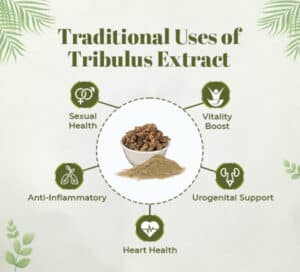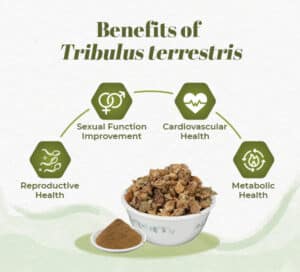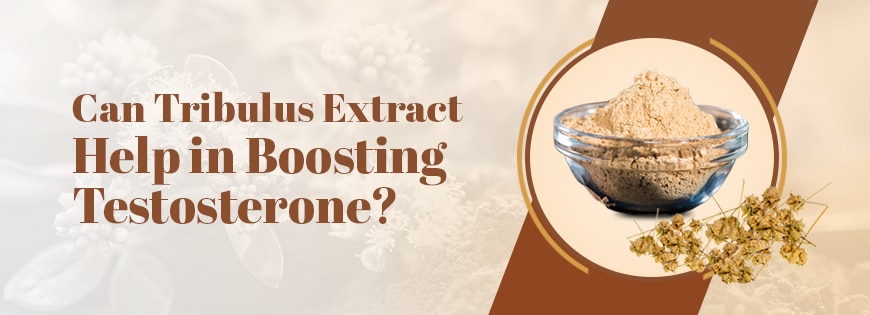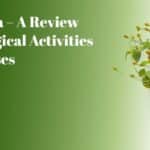Tribulus terrestris (TT), also known as puncture vine, Gokshura, or goat’s head, is a small leafy plant that thrives in parts of Europe, Asia, Africa, and the Middle East. For centuries, it has played an important role in Traditional Chinese Medicine and Indian Ayurveda as a general tonic for vitality, urogenital health, and sexual well-being.In recent years, it has gained widespread attention as a dietary supplement, particularly among athletes and men seeking to improve physical performance and reproductive health.
Traditional Uses and Bioactive Composition

Tribulus terrestris contains over 70 compounds, with steroidal saponins (particularly protodioscin) and flavonoids being the most significant active constituents. The particular composition varies based on geographical origin, with different regions producing plants with varying levels of active compounds. The root and fruit of the plant contain the highest concentration of these bioactive substances, which are believed to be responsible for its purported health benefits.
Traditionally, TT has been utilized for a variety of conditions including:
- Treatment of sexual difficulties
- Enhancing vitality and energy
- Addressing urogenital disorders
- Supporting cardiovascular health
- Reducing inflammation and chronic pain
Health Benefits of Tribulus Terrestris

1. Libido and Sexual Function
Tribulus terrestris may have a role in enhancing sexual desire. Studies show that men with low libido who took 750–1,500 mg daily for two months experienced up to a 79% increase in sexual desire. Similarly, around 67% of women with low libido reported significant improvements after supplementing with 500–1,500 mg daily for 90 days.
The herb has also been associated with better sexual satisfaction and arousal in women. However, results related to erectile dysfunction in men are mixed- some studies found no benefits at 800 mg per day, while others reported improved erections and satisfaction at a higher dose of 1,500 mg.
Also Read: Spilanthes acmella: A Review of Its Pharmacological Activities and Traditional Uses
Takeaway: TT may help improve libido in both women and men, particularly at higher doses, but its effectiveness for treating erectile dysfunction remains uncertain. More high-quality research is needed to confirm its sexual health benefits.
2. Reproductive Health
This systematic review and meta-analysis evaluated the profertility and aphrodisiac effects of Tribulus terrestris L. (TT) using 30 preclinical and clinical studies. TT significantly improved sperm concentration, motility, and viability in both humans and animal models. It also enhanced sexual performance indicators such as mounting and intromission frequency while reducing latency in castrated and normal rodents.
While TT showed inconsistent effects on testosterone, LH, and FSH levels, its aphrodisiac properties were evident. The active compound protodioscin likely contributes to these effects via antioxidant activity, Ca²⁺ regulation, and nitric oxide pathways. TT shows promising potential in male reproductive health.
Also Read: 11 foods that help lower blood pressure
3. Metabolic and Cardiovascular Support
Tribulus terrestris may support heart and metabolic health. Beyond its reputation for enhancing libido, Tribulus terrestris may offer benefits for heart health and blood sugar regulation. In a clinical study involving 98 women with type 2 diabetes, daily supplementation with 1,000 mg of T. terrestris over three months resulted in notable reductions in both blood glucose and cholesterol levels compared to a placebo group.
Similarly, animal studies suggest the herb may help lower blood sugar, protect blood vessels from damage, and prevent spikes in cholesterol.
While early results are encouraging, especially for people with diabetes, more human studies are needed to confirm these effects and determine appropriate dosing.
Now, the Most Asked Question:
Does Tribulus Terrestris Really Boost Testosterone?
Tribulus terrestris is often marketed as a natural testosterone booster. The proposed mechanism involves steroidal saponins, particularly protodioscin, stimulating luteinizing hormone (LH), which in turn signals the testis to produce more testosterone. This theory underpins many of its athletic and bodybuilding claims.
However, clinical evidence tells a different story.
A comprehensive review of 12 human clinical studies involving both healthy and sexually dysfunctional individuals (ages 14-60, duration 2-90 days) found no consistent or significant increase in testosterone levels following TT supplementation. Some modest effects were noted in subgroups- such as premenopausal women, where limited trials reported increased testosterone levels and improved sexual function-but these findings were often constrained by small sample sizes and low study quality.
Comparing Animal and Human Studies
A 2014 systematic review in the Journal of Dietary Supplements evaluated both animal and human studies. While some animal trials showed increases in testosterone, human studies-unless using a multi-ingredient formula-did not replicate these outcomes. This suggests that TT’s observed physiological benefits may be linked more to nitric oxide activity or non-hormonal pathways rather than a true hormonal boost.
Safety and Side Effects
Most clinical trials report that TT extracts and supplementation causes minimal side effects and is generally well-tolerated. However, isolated reports of toxicity exist, and in vitro studies have shown potential cytotoxic, genotoxic, and endocrine-disrupting effects, though their relevance to humans remains unclear. Common dosages in clinical studies range from 750-1,500 mg daily, with 750 mg being the most frequently studied dose.
Based on the current scientific evidence, Tribulus terrestris does not appear to significantly boost testosterone levels in humans, despite widespread marketing claims to the contrary. While some limited studies show modest effects in specific populations, the majority of well-designed research indicates minimal to no impact on testosterone levels, particularly in healthy men and athletes.
Also Read: What is Bakuchiol? Uses & Benefits for Skin
However, TT may offer benefits beyond testosterone enhancement, particularly for sexual function, reproductive health, and certain metabolic parameters. These effects appear to occur through mechanisms independent of testosterone modulation, possibly involving nitric oxide pathways and anti-inflammatory properties.
For individuals seeking natural testosterone enhancement, the current evidence does not support TT as an effective option. Those interested in TT for its other potential benefits should consult healthcare providers before supplementation, particularly given the variable quality and composition of commercial supplements.
Disclaimer: The Statement has not been evaluated by the EFSA, KFDA or FDA. This product is not intended to diagnose, treat, cure, or prevent any disease. While the information provided is based on credible references, we do not make any specific claims or guarantees. It is important to consult with your healthcare advisor for personalized advice and guidance related to your health.
Reference:
- Pro-sexual and androgen enhancing effects of Tribulus terrestris L.: Fact or Fiction
- Evaluation of the efficacy and safety of Tribulus terrestris in male sexual dysfunction-A prospective, randomized, double-blind, placebo-controlled clinical trial
- Insights into Supplements with Tribulus Terrestris used by Athletes
- Clinical Assessment of Tribulus terrestris Extract in the Treatment of Female Sexual Dysfunction
- Chemical Constituents, Biological Properties, and Uses of Tribulus terrestris: A Review
- A systematic review on the herbal extract Tribulus terrestris and the roots of its putative aphrodisiac and performance enhancing effect
- The Profertility and Aphrodisiac Activities of Tribulus terrestris L.: Evidence from Meta-Analyses
- The Effects of 6 Weeks of Tribulus terrestris L. Supplementation on Body Composition, Hormonal Response, Perceived Exertion, and CrossFit® Performance: A Randomized, Single-Blind, Placebo-Controlled Study
- Testosterone Boosters: How Real Are Their Effects?
- How much Tribulus terrestris should I take daily?
- A Comprehensive Review of the Phytochemical, Pharmacological, and Toxicological Properties of Tribulus terrestris L.
- Evaluation of the efficacy and safety of Tribulus terrestris in male sexual dysfunction-A prospective, randomized, double-blind, placebo-controlled clinical trial
- Effects of Tribulus terrestris L. on Sport and Health Biomarkers in Physically Active Adult Males: A Systematic Review
- Influence of Tribulus terrestris extract on lipid profile and endothelial structure in developing atherosclerotic lesions in the aorta of rabbits on a high-cholesterol diet
- Efficacy of the Hydroalcoholic Extract of Tribulus terrestris on the Serum Glucose and Lipid Profile of Women With Diabetes Mellitus: A Double-Blind Randomized Placebo-Controlled Clinical Trial
- Pro-sexual and androgen enhancing effects of Tribulus terrestris L.: Fact or Fiction
- Tribulus terrestris for treatment of sexual dysfunction in women: randomized double-blind placebo – controlled study




